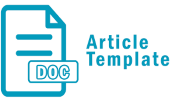Social Media Police to Shape Citizen Ethics in The Digital Age
Abstract
Along with the times, technological advances greatly affect all daily activities, one of which is the existence of social media which is a tool for communicating and socializing, there are many conveniences that are felt by the existence of social media, for example in the fields of education, economics, social and politics, but sometimes this communication in social media can backfire against the users themselves, this happens because of the unwise use of social media. The number of cases that are detrimental to victims in the unwise use of social media has become one of the triggers for conflicts and even divisions between groups, so that the government proposes to form social media police which is expected to be able to monitor social media users to be wiser in the use of social media and provide sanctions for anyone who violates this policy in the use of social media. With current technological advances, knowledge about how to be a good society is very much needed, so Digital Citizenship must begin to be formed for the whole community to shape the character of how to use social media well.
Keywords
Full Text:
PDFReferences
Abdin, M. (2020). Kedudukan dan peran warga negara dalam masyarakat multikultural. Jurnal Pattimura Civic (JPC), 1(1), 17-25.
Anwar, F. (2017). Perubahan dan permasalahan media sosial. Jurnal Muara Ilmu Sosial, Humaniora, dan Seni, 1(1), 137–144.
Arif, M. (2021). Tugas dan fungsi kepolisian dalam perannya sebagai penegak hukum menurut Undang-Undang Nomor 2 Tahun 2002 tentang kepolisian. Al-Adl: Jurnal Hukum, 13(1), 91-101.
Ariyanti, D. M. (2018). Fenomena cyber public relations pada lembaga pemerintah non kementerian. Magenta| Official Journal STMK Trisakti, 2(02), 355-371.
Astajaya, I. K. M. (2020). Etika komunikasi di media sosial. Widya Duta: Jurnal Ilmiah Ilmu Agama dan Ilmu Sosial Budaya, 15(1), 81-95.
Donnison, S. (2007). Unpacking the millennials: A cautionary tale for teacher education. Australian Journal of Teacher Education, 32(3), 1–13.
Fahrimal, Y. (2018). Netiquette: Etika jejaring sosial generasi milenial dalam media sosial. Jurnal Penelitian Pers dan Komunikasi Pembangunan, 22(1), 69–78.
Isman, A., and Canan Gungoren, O. (2014). Digital citizenship. Turkish Online Journal of Educational Technology-TOJET, 13(1), 73-77.
Jasardi, M., Thalib, H., dan Baharuddin, H. (2020). Kewenangan penyidik kepolisian negara republik indonesia terhadap tindak pidana narkotika: Studi polres wajo. Journal of Lex Generalis (JLG), 1(6), 805-820.
Jorring, L., Valentim, A., and Porten-Cheé, P. (2018). Mapping a changing field: A literature review on digital citizenship. Digital Culture & Society, 4(2), 11-38.
Prensky, M. (2001). Digital natives, digital immigrants. MCB University Press: The Horizon, 9(5), 1-6.
Puspitarini, D. S., dan Nuraeni, R. (2019). Pemanfaatan media sosial sebagai media promosi. Jurnal Common, 3(1), 71-80.
Roza, P. (2020). Digital citizenship: Menyiapkan generasi milenial menjadi warga negara demokratis di abad digital. Jurnal Sosioteknologi, 19(2), 190-202.
Samsuni, S. (2014). Peran dan tanggung jawab guru dalam membentuk etika, moral dan akhlak siswa sebagai bagian dari anggota masyarakat. Kariman: Jurnal Pendidikan dan Keislaman, 2(1), 57-68.
Sandra, M., dan Dewi, R. (2019). Islam dan etika bermedia (kajian etika komunikasi netizen di media sosial instagram dalam perspektif Islam). Research Fair Unisri, 3(1), 139–142.
Soliha, S. F. (2015). Tingkat ketergantungan pengguna media sosial dan kecemasan sosial. Interaksi: Jurnal Ilmu Komunikasi, 4(1), 1-10.
Suyatno. (2012). Nilai, norma, moral, etika dan pandangan hidup perlu dipahami oleh setiap warga negara dalam kehidupan berbangsa dan bernegara. PKn Progresif, 7(1), 35–44.
Syukur, M. (2018). Distribusi perspektif etika ekonomi Islam. Profit: Jurnal Kajian Ekonomi dan Perbankan Syariah, 2(2), 33-51.
Utari, I. D., Kushartono, T., dan Amanita, A. (2019). Analisis yuridis putusan mahkamah konstitusi nomor 97/ppu-xiv/2016 terkait pengosongan kolom agama pada kk dan ktp bagi penganut kepercayaan dalam kaitannya dengan hak konstitusional penganut kepercayaan memperoleh hak-hak dasar warga negara. Jurnal Dialektika Hukum, 1(1), 48-77.
Warpindyastuti, L. D., dan Sulistyawati, M. E. S. (2018). Pemanfaatan teknologi internet menggunakan media sosial sebagai sarana penyebaran informasi dan promosi pada min 18 Jakarta. Widya Cipta: Jurnal Sekretari dan Manajemen, 2(1), 91-95.
DOI: https://doi.org/10.17509/civicus.v22i1.47911
Refbacks
- There are currently no refbacks.
Copyright (c) 2022 Syifa Nurul Latiefah, Widya Devita Sari, Deny Zein Tarsidi

This work is licensed under a Creative Commons Attribution-NonCommercial-ShareAlike 4.0 International License.
Our journal indexed by :
Jurnal Civicus is published Univesitas Pendidikan Indonesia in collaboration with Indonesia Association Profession of Pancasila and Civic Education/Asosiasi Profesi Pendidikan Pancasila dan Kewarganegaraan (AP3KnI).

Jurnal Civicus is licensed under a Creative Commons Attribution-NonCommercial-ShareAlike 4.0 International License.





__.png)










